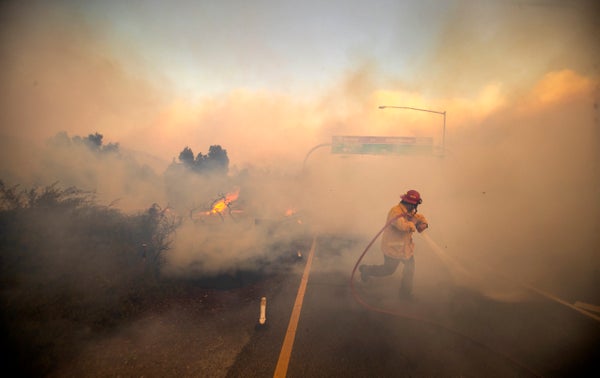November 26, 2024
3 min learn
Wildfire Smoke Linked to Elevated Danger of Dementia
The particles that make up wildfire smoke might elevate the danger of dementia much more than comparable airborne pollution from different sources

A firefighter is surrounded by heavy smoke as he battles the advancing Silverado Hearth fueled by Santa Ana winds on the 241 toll street and Portola Parkway on October 26, 2020 in Irvine, California.
Allen J. Schaben/Los Angeles Instances through Getty Photos
CLIMATEWIRE | Wildfire smoke can irritate a wide range of medical circumstances, from bronchial asthma to coronary heart illness.
Now, new analysis provides one other fear to the combination. It could elevate the danger of dementia.
A study published Monday within the scientific journal JAMA Neurology, finds that long-term publicity to smoke concentrations is related to a better threat of dementia prognosis over time. For each one microgram enhance in wildfire air pollution per cubic meter of air over the course of a three-year interval, the percentages of dementia prognosis rise by about 18 p.c, the examine finds.
On supporting science journalism
If you happen to’re having fun with this text, take into account supporting our award-winning journalism by subscribing. By buying a subscription you might be serving to to make sure the way forward for impactful tales concerning the discoveries and concepts shaping our world as we speak.
That’s in contrast with every individual’s baseline threat of dementia prognosis, which stays comparatively low among the many normal inhabitants. Nonetheless, the elevated dangers are massive sufficient to pose a public well being concern.
The examine focuses on a type of air air pollution often known as particulate matter — tiny, inhalable particles, with diameters of two.5 micrometers or smaller. This sort of air air pollution can originate from a wide range of sources, together with vehicles, industrial sources and fires.
Earlier research have already got steered that particulate matter can enhance the danger of dementia, amongst different well being issues. The brand new analysis zooms in particularly on particles produced by wildfire smoke, which may have totally different chemical and bodily properties than particles produced by different sources.
The examine examined medical data from greater than 1 million folks in Southern California from 2008 to 2019, all a part of the Kaiser Permanente Southern California medical care consortium. It additionally analyzed air high quality data from the identical time interval to estimate long-term air pollution concentrations, together with particles stemming straight from wildfire smoke.
The examine discovered that wildfire smoke will increase the danger of dementia considerably greater than particulate matter from different sources. There are a number of causes that may very well be the case, the researchers say.
Wildfire smoke particles are likely to have increased concentrations of molecules recognized for poisonous or inflammatory properties. And wildfire smoke tends to spike at sure occasions of the yr, in contrast with other forms of air air pollution — intermittently exposing communities to extraordinarily excessive air pollution concentrations, which can have higher results on their well being.
The examine additionally discovered that sure demographics are at increased threat than others, together with folks with decrease incomes and other people of shade, together with Black, Hispanic and Asian communities.
Low-income communities usually are at increased threat of publicity to air air pollution, the researchers notice. Decrease high quality housing in these communities might enable particulate matter to infiltrate houses extra simply, and residents might have much less entry to air filtration programs.
Marginalized teams additionally might cope with extra well being challenges, partly due to systemic discrimination, compounding their dangers of growing dementia later in life.
“We all know that local weather change impacts probably the most susceptible communities first and worst and we seem to see the same sign in our information,” stated Joan Casey, an environmental epidemiologist and co-author of the brand new examine, in an e mail to POLITICO’S E&E Information.
Policymakers can take sure steps to guard these susceptible communities, she added. They will guarantee that all communications about public well being are issued in a number of languages. And so they can push for insurance policies aimed toward combating local weather change, lowering different sources of air air pollution and mitigating wildfires by way of methods reminiscent of science-based managed burns.
In the meantime, there are different questions that scientists can study in future analysis.
The brand new examine checked out dementia of all types. However future research can examine whether or not sure varieties of circumstances, reminiscent of Alzheimer’s illness, have stronger ties to wildfire smoke than others.
The analysis group can be “very curious” concerning the results of a number of local weather hazards working collectively, Casey added. If wildfires occur to coincide with energy outages, as an example, that would prohibit the power of many households to make use of air filtration programs — doubtlessly worsening their well being dangers.
These sorts of questions are rising extra pressing as the results of local weather change worsen. Recent research has found that a couple of quarter of all particulate matter air pollution in the US comes from wildfire smoke. And in components of the Western U.S., smoke is accountable for as a lot as half.
Reprinted from E&E News with permission from POLITICO, LLC. Copyright 2024. E&E Information offers important information for power and surroundings professionals.


